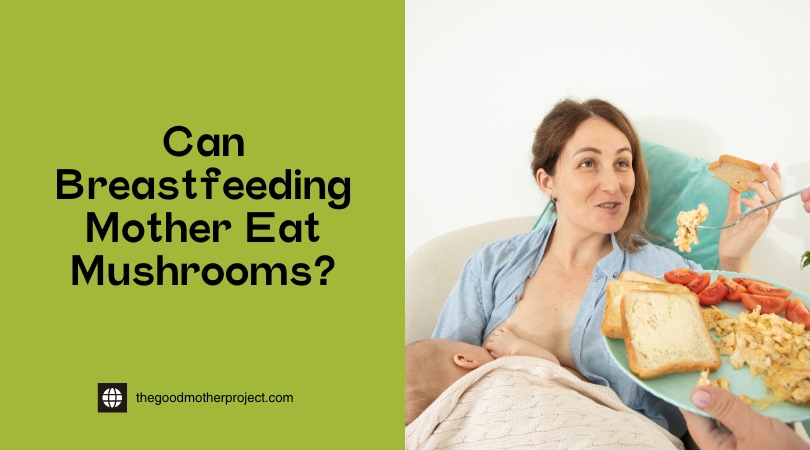Last Updated on January 6, 2025
Yes, breastfeeding mothers can eat mushrooms. Most varieties are safe and nutritious, but some should be avoided.
Mushrooms are a popular food choice, packed with nutrients that can benefit both mother and baby. They are low in calories and rich in vitamins, minerals, and antioxidants. Many types, like button, shiitake, and portobello, offer health benefits without any known risks during breastfeeding.
However, some wild mushrooms can be toxic, so it’s essential to stick with store-bought options. Always wash mushrooms thoroughly to remove any pesticides or contaminants. When introducing new foods, monitor your baby for any allergic reactions. Understanding what’s safe ensures that breastfeeding mothers can enjoy a diverse and healthy diet while nourishing their little ones.
Mushrooms: A Nutritional Powerhouse
Mushrooms are more than just a tasty addition to meals. They offer numerous health benefits, especially for breastfeeding mothers. Packed with essential nutrients, mushrooms can support both mother and baby. Let’s explore their incredible nutritional profile.
Rich In Vitamins And Minerals
Mushrooms are a fantastic source of vitamins and minerals. They contain:
- Vitamin D: Supports bone health.
- Vitamin B: Aids energy production.
- Potassium: Regulates blood pressure.
- Iron: Essential for blood health.
These nutrients play a crucial role in overall health. For breastfeeding mothers, they help in:
- Boosting energy levels.
- Strengthening the immune system.
- Supporting healthy milk production.
Low-calorie Source Of Fiber
Mushrooms are low in calories but high in fiber. This makes them a great food choice for mothers. The benefits include:
- Promoting digestive health.
- Helping maintain a healthy weight.
- Keeping you feeling full longer.
Here’s a quick comparison of calories and fiber content in common mushrooms:
| Mushroom Type | Calories (per 100g) | Fiber (g) |
|---|---|---|
| White Mushrooms | 22 | 1.0 |
| Shiitake Mushrooms | 34 | 2.5 |
| Portobello Mushrooms | 29 | 1.8 |
Including mushrooms in your diet can enhance nutrition. They are versatile and can be added to many dishes. Enjoy them in salads, soups, or stir-fries.
Safety And Benefits Of Mushrooms For Nursing Mothers
Mushrooms can be a great addition to a nursing mother’s diet. They offer various nutrients and potential health benefits. However, safety should always come first. Understanding which mushrooms are safe is crucial for both mother and baby.
Boosting Milk Production
Mushrooms contain important nutrients that may help in milk production. Here are some benefits:
- Vitamin D: Supports calcium absorption, important for milk quality.
- Vitamin B: Essential for energy levels, which helps nursing mothers stay active.
- Iron: Helps to prevent fatigue, keeping mothers healthy and alert.
Some specific types of mushrooms may be beneficial:
| Mushroom Type | Benefit |
|---|---|
| Shiitake | Boosts immune system and energy levels. |
| Button | Rich in nutrients for overall health. |
| Reishi | May help reduce stress, improving milk flow. |
Potential Allergens To Consider
While mushrooms are generally safe, some mothers may experience allergies. It’s essential to watch for symptoms. Common allergens include:
- Skin rashes
- Swelling
- Difficulty breathing
Always introduce new foods slowly. Keep track of any reactions. Seek medical advice if necessary.
Organic mushrooms are usually safer. They are less likely to contain harmful pesticides. Always wash them thoroughly before cooking.
Choosing And Preparing Mushrooms For Breastfeeding Diets
Breastfeeding mothers often wonder about their diet. Mushrooms can be a healthy addition. They are rich in nutrients and flavor. Choosing the right mushrooms and preparing them properly is essential.
Selecting Safe Varieties
Not all mushrooms are safe for breastfeeding mothers. Focus on these safe options:
- Button Mushrooms: Common and versatile.
- Shiitake Mushrooms: Great for soups and stir-fries.
- Portobello Mushrooms: Perfect for grilling.
- Oyster Mushrooms: Delicate flavor and texture.
Avoid wild mushrooms unless identified by an expert. Some can cause adverse reactions. Always choose organic if possible. This reduces exposure to pesticides.
Preparation Tips To Maximize Benefits
Proper preparation enhances the benefits of mushrooms. Follow these tips:
- Wash Thoroughly: Rinse mushrooms under cold water.
- Cook Well: Cooking eliminates harmful bacteria.
- Slice Thinly: This helps them cook evenly.
- Add to Dishes: Include mushrooms in soups, salads, or stir-fries.
Consider these cooking methods:
| Method | Benefits |
|---|---|
| Sautéing | Enhances flavor with minimal oil. |
| Grilling | Adds a smoky taste. |
| Steaming | Retains nutrients well. |
Mushrooms are nutritious. They support overall health. Enjoy them as part of a balanced diet.
Frequently Asked Questions
Can Breastfeeding Mothers Eat All Mushrooms?
Not all mushrooms are safe. Stick to well-known varieties like button, shiitake, and portobello.
Are Mushrooms Nutritious For Breastfeeding Moms?
Mushrooms are rich in vitamins, minerals, and antioxidants, supporting both mom’s health and milk quality.
Do Mushrooms Affect Breast Milk Flavor?
Some mushrooms can alter breast milk’s flavor, but most babies adapt quickly to these changes.
Can Certain Mushrooms Harm Breastfeeding Infants?
Avoid wild mushrooms and varieties like amanita, as they can be toxic and harmful to infants.
How Should Mushrooms Be Prepared For Safety?
Cook mushrooms thoroughly to eliminate harmful bacteria and enhance their nutritional benefits.
Conclusion
Breastfeeding mothers can enjoy mushrooms as part of a balanced diet. These nutrient-rich foods offer various health benefits. Always choose fresh, well-cooked mushrooms to avoid potential risks. Pay attention to your baby’s reactions after consuming them. A mindful approach ensures both mother and baby can thrive together while enjoying diverse foods.








